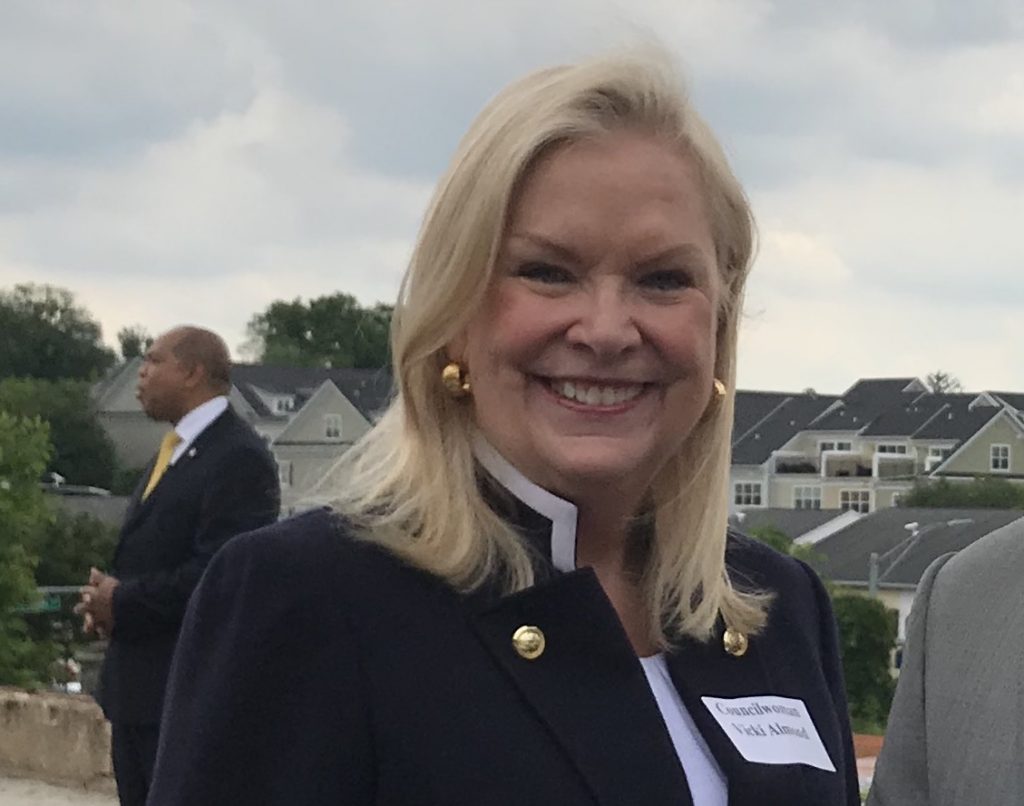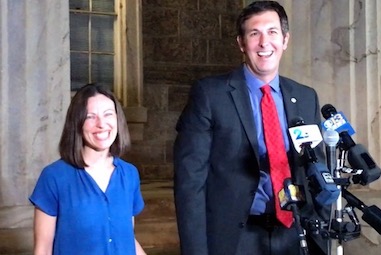After placing a distant third in a prominent poll shortly before the election, former state delegate John Olszewski Jr. of Dundalk has won the Democratic primary for Baltimore County executive following a recount that ended Saturday.
Olszewski originally beat state Sen. Jim Brochin by just nine votes, and Councilwoman Vicki Almond by 969 votes. Because the margin was so slim, Brochin petitioned for the recount, which concluded Saturday. But Olszewski actually picked up votes during the recount and ended up with a 17-vote margin of victory.
“We’re going to soak it in tonight but tomorrow it’s back to work,” Olszewski told supporters in Dundalk on Saturday evening. “Back to talking about the same things we’ve been focused on since this campaign began: Better schools, 21st century jobs, and an open and accessible, transparent government that works for every single person and every single community across our great county.”
Brochin indicated he would not challenge the outcome.

Brochin
“Now that the recount is concluded, I want to thank the Baltimore County Board of Elections for its hard work and diligence these past few weeks. The Board went out of its way to be fair to each campaign, and always acted with the highest integrity. Just as important, I want to congratulate John Olszewski Jr. for a hard-fought campaign victory. I wish him well,” Brochin said in a statement on Facebook.
“To my supporters in the Democratic primary: Please know that your vote was not cast in vain. Even out of office, I will continue to fight against over development in our county, and make every effort as a private citizen to preserve and protect open space.
“Finally, to my constituents in the 42nd District: Thank you for giving me the opportunity to be the representative for all political persuasions. And thank you for allowing me the intellectual freedom to make decisions on your behalf, regardless of political party, ideology and special-interest influence. I couldn’t have asked for better people to represent. It’s been an honor,” Brochin said.
In an interview, Brochin said he didn’t feel a court challenge was necessary.
“We’re not poor sports,” he said. “We lost fair and square.”
He said he’ll focus on the remainder of his his term as a state senator — a seat he held for 16 years — and work to make sure his successor has all the information and contacts he needs to be successful. (Democrat Robbie Leonard will be facing Republican Chris West in the race to succeed Brochin.) And he’ll go back to his day job, Brochin said, as an insurance broker.
The campaign was marked by attacks from Almond’s camp claiming Brochin had an “A” rating from the NRA and was too conservative to be the Democrats’ candidate. Brochin did take NRA and other pro-gun money up until 2010, but in 2014 he received an “F” from the NRA — his current grade — after voting in favor of the Maryland Firearms Act of 2013.

Almond at Towson Row groundbreaking
Almond’s attack ads were paid for by a slate that was started by former County Executive Jim Smith, and by a super PAC that was largely funded by local developers.
Brochin routinely criticized Almond for what he called “pay-to-play” politics in which, he said, her votes were too friendly to the developers that gave her campaign money.
“Somebody needs to stand up to these developers and say No. And it’s a culture that goes beyond [Councilwoman Vicki Almond] that goes back 30 or 40 years in council after council — it’s just not new to this county council,” he said.
“They feed campaign contributions to council people, country club memberships to our County Executive and previous ones, and say, OK, we’re going to develop wherever we want and we’re going to tear up as much open space as we want, and then we’re going to go to our homes, wherever they are, and all of you are stuck with the results.”
Olszewski — whose name is pronounced “Ol-shess-kee” but who is often referred to as Johnny O — was able to largely stay out of the fray even though he had taken some positions that ran counter to the progressive label he now embraces, perhaps because he was not seen as a threat by Almond.
Olszewski voted against the Firearm Safety Act of 2013 and also voted to allow domestic abusers to keep their guns. He received a 93% from the National Rifle Association’s Political Victory Fund in 2014, and an 8% in 2010.
In an April interview, Olszewski said he made the wrong call on guns: “It’s important that leaders are able to reflect on their positions and evolve. I can say I got that one wrong. As county executive, I will be focused on making sure all families are safe, and I will be supporting additional reforms in the future.”
He has a 30% overall approval rating from Maryland Right to Life, but he got a 100% rating in 2009 because of a vote on “ethical” stem cell use in research, and a 50% rating in 2014 for supporting legislation to eliminate taxpayer funding of third-trimester abortions. Three other years he received a 0% rating.
In a 2010 questionnaire asking if he was pro-choice or pro-life, Olszewski said, “I believe that we must do all that we can to prevent unplanned pregnancies. Rather than focusing energies in an argument about ‘pro life/pro choice,’ we should focus instead on eliminating the need for that choice in the first place.”
Olszewski was also endorsed by The Baltimore Sun‘s editorial board.
“The most crucial of these [issues facing the county] is his support for Baltimore County’s housing discrimination settlement with the federal government. The best anyone else in the race can muster for it is grudging acceptance, which is a prime indication that they fail to understand what’s at stake,” the Sun said. “Unless Baltimore County takes affirmative steps to help integrate affordable housing throughout all its communities, it will develop the kinds of concentrated pockets of poverty that have plagued Baltimore City for decades, and it will reap all the attendant social problems that go with them.”
Del. Steve Lafferty, who represents Towson in the state legislature, also supported Olszewski.
“I think it’s a great day for Baltimore County and for Democrats in Baltimore County,” Lafferty said Saturday evening. “I think Johnny will be able to unify Democrats across the political spectrum and across the county and put in place a vision for where the county should be going.”
Olszewski was just 23 when he was appointed to fill a vacant seat in the Maryland House of Delegates. Since then, he was elected to the seat twice, then lost a bid for the state Senate in 2014.
The son of a four-term county councilman, he’s been a teacher in Baltimore County Public Schools, is now an executive with a software company, and recently earned his PhD in public policy from the University of Maryland Baltimore County.
Olszewski also spent part of 2015 as a lobbyist in Baltimore City’s transportation department. One of his jobs was to promote the Red Line, a proposed light-rail route that would have connected the western portion of the county to East Baltimore. Gov. Larry Hogan eventually killed the project.
It’s in part that experience, he said in a January interview, that makes him now want to focus on more biking and public-transit options — including a Towson circulator bus.
“I think if we can show success there, it’s something we can replicate in other parts of the county,” he said. “Unfortunately in Baltimore County we do a lot of road paving and that’s it. Now, I’m all for paving our roads and having good infrastructure, but we also have to think of other modes of transportation.”
Related: Vicki Almond talks Royal Farms, school construction and more
Development is always a major issue in Baltimore County, and the question of public financing for Towson Row highlighted candidates’ philosophies. Almond voted in favor of a $43 million aid package for the stalled mixed-use development at the corner of York Road and Towsontown Boulevard. Brochin and Olszewski both said they would have preferred a loan or other support for the project.
Olszewski said Towson Row should happen and that it could be “transformative” for Towson, but that he doesn’t want taxpayers “on the hook” if for some reason the project is not a success. He’s also worried about the precedent it sets.
“I think you run the risk of having developers come in and say, ‘I need a similar set of supports,’” Olszewski said.
Related: Brochin targets developer influence in County Executive bid
The three priorities for Olszewski in the county executive race were job creation, education and accessible government.
He said he’d like to expand the Employment Advancement Right Now (EARN) act that he co-sponsored in the General Assembly. The program gets feedback from local companies about what kind of skilled labor they need, then helps train people for those jobs. He also wants to create arts-and-entertainment districts and expand the county’s economic development initiatives.
In education, he wants to see voluntary universal pre-K, more investment in school infrastructure, and a renewed emphasis on training for trade jobs — including “the trades of the future” such as coding, cyber security and health care.
In the area of government, he’d like to see an app that makes connecting to county services easier, evening work sessions — instead of afternoon sessions — for the County Council so that more people can participate, training for communities on how to participate in government and how to understand the county budget.
Olszewski and his wife, Marisa, live in Dundalk with their toddler, Daria. His father, John Olszewski Sr., retired from the Baltimore County Council in 2014 after serving four terms. Between his father’s longevity on the council and Olszewski Jr.’s appointment to the General Assembly at a young age, there is a perception among some that he is part of the old guard — at a time when people want change.
But he doesn’t see it that way.
“I’m the only one calling for ending the current campaign finance structure and providing more meaningful ways for people to participate in our government. I’m the candidate who’s calling for work sessions to be in the evenings, who’s calling for more budget hearings, who wants to open up government through technology,” he said in January.
“I don’t have massive campaign contributions funneling in from the development community. Certainly there will be some … but not in ways that are overwhelming,” he said. “I can walk in as county executive and look at a community and say ‘We’re going to make the best decision for you’ because I’m not beholden to anyone.”
In a Facebook post on July 6, after the initial 9-vote win for Olszewski was announced, Brochin said: “I am humbled by the support we received in this election, and I want to thank everyone who sacrificed so much on my behalf. Also, I want to thank the Baltimore County Board of Elections for their tremendous hard work. Obviously, in an election this close, we will be exploring the possibility of requesting a recount. Finally, my best to Johnny O on a hard fought campaign.”
The race, in which nearly 90,000 ballots were cast, had 93 “over votes,” according to The Baltimore Sun’s Pamela Wood.
An over vote is a vote that can’t be counted by the scanner because the voter mistakenly voted for more than one candidate in a race — voting for both Brochin and Olszewski, for example — or when something else goes wrong with the ballot. It could be that the voter put a checkmark in the oval instead of filling it in, it could be a crease in the paper that caused the scanner to misread the ballot even though the oval was filled in correctly, or other similar complications. When that happens, those ballots must be manually inspected — with representatives from both campaigns able to weigh in as election officials try to determine the voter’s intent.
There were several disputed ballots in which the Brochin and Olszewski campaigns disagreed on how a vote should be interpreted or whether it met the proper qualifications.
The number of disputed over votes will be important in deciding whether to pursue a court challenge, said John T. Willis, former Maryland secretary of state and currently a professor at the University of Baltimore.
“This isn’t over until all parties involved have exhausted their legal remedies,” Willis said.
In the past three decades there has only been one other recount in Baltimore County. That was in 2014 in the Republican primary for county executive when George Harman beat Tony Campbell by just 18 votes. A recount gave Harman two more votes — for a total of 20 — and he became the Republican nominee, according The Baltimore Sun. Harman was then defeated by Democrat Kevin Kamenetz.
Earlier this month in a Howard County Council primary race, Liz Walsh defeated Jon Weinstein by just two votes. A recount then gave her four more votes, according to Maryland Matters.
And in Virginia this past fall, a race for a seat in the state legislature made national news for its recount and legal challenge. Republican David Yancey beat Democrat Shelly Simonds by 10 votes, but then a recount gave Simonds a one-vote lead. However, a court ruled that one of the Simonds ballots should have been discarded — meaning the vote was tied.
Following Virginia’s election procedure, the two candidates’ names were put in a bowl and the one that was chosen (Yancey) took the seat.
If Brochin does not challenge the findings in court or if he does but the challenge fails, Olszewski is set to face Republican Al Redmer, the state’s insurance commissioner and Hogan ally, in November.
-Kris Henry,
The Towson Flyer

